| |
 Project
Overview Project
Overview
 Project
Elements Project
Elements  Contributions Contributions
Website
About Truku tribe
About Shinbaiyang
Thanksgiving ceremony
Experiencing Thanksgiving
ceremony
The Priest
Sacrificial offerings
Project research
|
|
  |
|
(1)Project URL:http://librarywork.taiwanschoolnet.org/gsh2009/gsh5845/
(2)Backup site:http://210.240.88.200/2009website_english/
(3)School website:http://www.cchps.hlc.edu.tw
(4)Project completion date:
February 27, 2009
(5)School: Hualien County Jian
Ching Elementary School
(6)School address:No.89, 7
Ling,Jianching Village,Wanrong
Township,Hualien County.
(7)Advising teachers: Director
Shou-liang Hsu, Teacher De-lin
Ai, Teacher Shu-jun Hua
(8)Parents and volunteers: 4
(9)Number of students: 10
(10)Their ages: 10-12
(11) E-mail:
shouliang120845683@yahoo.com.tw
|
 |
|
(1)Category |
|
Local Arts and Music |
|
(2) Our community |
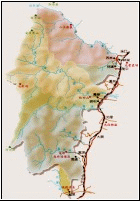 Wanrong
Township is
located in the
central Hualien
and the eastern
root of Central
Mountains. Truku
and Bunun are
the two
indigenous
tribes in this
township and
Truku
contributes to
the major
population.
During the
history, Truku
tribe has been
used to migrate.
The historical
data about Truku
people are
limited due to
their habit of
living in the
deep and vast
mountains, loose
distribution of
residents, and
living on their
own, making it
difficult for
outsiders to
visit or contact
them. The
government has
established many
systems to
protect
indigenous
peoples’
cultures, which
are diversified
and unique,
especially the
culture of
facial tattoo
and cloth
weaving (spool
spinning).
Exploring the
tribal cultures
has also become
a trend. A large
number of elders
and local
residents of
Wanrong Township
have shown their
passion and
caring towards
tribal cultures,
including Yusi
Weaving Studio,
Tuxi Studio, and
Malibasi
Cultural Studio
from Wanrong
Village; Ai-mei
Feng who makes
craft products,
Payi Iyang, a
talented and
kind artist,
Payi Uhay who
specializes in
traditional
cloth weaving as
well as Rong-fa
Li, Rong-gui Li,
and Jin-de
Chiang, who
creates
traditional
ramie back nets
from Jianching
Village and
Sachi Aboriginal
Studio and
Hongyeh
Mountainous
Woodcarving
Studio from
Hongyeh Village. Wanrong
Township is
located in the
central Hualien
and the eastern
root of Central
Mountains. Truku
and Bunun are
the two
indigenous
tribes in this
township and
Truku
contributes to
the major
population.
During the
history, Truku
tribe has been
used to migrate.
The historical
data about Truku
people are
limited due to
their habit of
living in the
deep and vast
mountains, loose
distribution of
residents, and
living on their
own, making it
difficult for
outsiders to
visit or contact
them. The
government has
established many
systems to
protect
indigenous
peoples’
cultures, which
are diversified
and unique,
especially the
culture of
facial tattoo
and cloth
weaving (spool
spinning).
Exploring the
tribal cultures
has also become
a trend. A large
number of elders
and local
residents of
Wanrong Township
have shown their
passion and
caring towards
tribal cultures,
including Yusi
Weaving Studio,
Tuxi Studio, and
Malibasi
Cultural Studio
from Wanrong
Village; Ai-mei
Feng who makes
craft products,
Payi Iyang, a
talented and
kind artist,
Payi Uhay who
specializes in
traditional
cloth weaving as
well as Rong-fa
Li, Rong-gui Li,
and Jin-de
Chiang, who
creates
traditional
ramie back nets
from Jianching
Village and
Sachi Aboriginal
Studio and
Hongyeh
Mountainous
Woodcarving
Studio from
Hongyeh Village.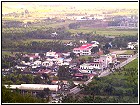
Truku tribe in
Wanrong Township
holds the
Ancestral
Worship Ceremony
every year,
preserving its
unique and rich
cultures and
interprets the
meaning and
value of the
tribe’s life
cultures. The
traditional
ceremonies,
crafts, and
cultural
activities are
the wisdom
passed down by
the ancestors.
The
Ancestral
Worship
Ceremony is also
the best way of
understanding
their cultures
and marketing
the local
industries.
|
|
(3) Project Overview |
Worship ceremony is a way people show their
appreciation to the ancestors. Each tribe has
its own worship ceremonies.
The Truku
tribe
holds the Thanksgiving Ceremony in awe and with
appreciation to the ancestors for their
blessings. There are no impressive scenes in
traditional ceremonies, only dignified
atmosphere. As members of Truku
tribe, we would like
to introduce the Thanksgiving
Ceremony to every one because we believe it is
our responsibility to explore the profoundness
of this important tribal ceremony.
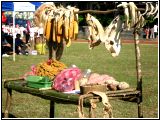 |
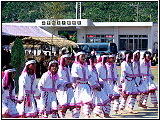 |
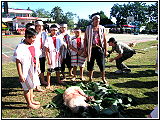 |
|
Objects on the ceremony stage |
Performances posterior to the
ceremony |
Preys to the hunting team |
We
visited Shioulin Township and Wanrong
Township in Hualien County, which cover the
biggest population of Truku
tribe in Taiwan,
aiming to explore the great
Thanksgiving Ceremony through participation.
During the ceremony, we could see principles
left by the ancestors, from the preparation
of items offered at the altars, the process
of the ceremony, the oracle’s prayers to the
presentation of celebration dances. Though
videos and documents, we share our past;
through actual participation and
Thanksgiving activities, we experience the
solemn ceremony; through ceremonies, music,
and dances, we experience traditional
cultures; through interviews with elders and
people from the communities, we learn from
the wisdom passed down by the ancestors.
The faculty and students of Jian Ching
Elementary School would like to take the
responsibility of receiving and passing on
the cultures. Through field investigatiojns
and interviews, we continue and succeed the
cultures of the tribe with the school and
resources provided by the community to offer
more people the opportunity of understanding
the cultures of Truku
tribe.
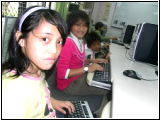 |
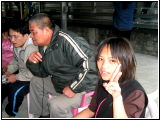 |
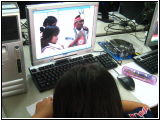 |
|
Through computerized information
process and interviews |
Through video conferences |
Through participation thoughts and
reports |
|
|
(4)Our Computer and Internet
Access
|
|
The high-speed fiber-optic
broadband internet access in our
school greatly shortens the time
of uploading and downloading
data. The students, teachers and
volunteers spent most of their
day-time on visits, experience
activities and uploading
records; therefore, the creation
of web pages mostly took place
on Saturdays. The school
teachers were responsible for
the final amendments. With at
least 256K/64K fiber optic
broadband access at home or
other locations, they contacted
the volunteers from Tzu Chi
University and other teachers
through emails. Certain computer
servers were provided on the
campus for uploading thoughts
and reports provided by each
team while the plan executer was
responsible for uploading the
schedule reports of the creation
of the Cyberfair web site. |
|
(5) Problems We Had To Overcome |
|
Difficulties |
Situation |
Solution |
(1)Technical barriers
 |
Students only knew how to use
the internet and type when doing
the background research;
therefore, it took much time
instructing them using digital
devices and creating web pages. |
With the school’s information
courses, we enhanced students’
ability to use digital
camcorders, cameras, and digital
Dictaphones as well as
information transmission skills.
The teachers also helped the
students to create web pages
during noon breaks in the
computer rooms |
(2)Language
 |
During the process of the
interviews and the experience
activities, the interviewees
were only a few chiefs of the
tribe so the relevant
information was limited and
translation was also needed. |
We tried to record the
interviews through digital
camcorders and Dictaphones and
asked the parents or the senior
citizens in the community
questions when we were
organizing the data after the
interviews. Whenever the seniors
described relevant items’ names,
items’ parts or operation, we
would ask them to use body
language or repeat expression to
leave a stronger impression. |
(3)Experience
 |
This was the second time of our
school’s participate in
Cyberfair so we had previous
experience and data. |
The experienced teachers carried
on the work. |
(4)Concepts

 |
This time was a presentation of
the research work. The research
team should establish a correct
attitude towards the research.
The research included meeting
discussions, work arrangement,
data collecting, information
device operating, information
digitalizing and organizing,
video processing, and web pages
creation. This was a broad
research so dilemmas sometimes
happened when they could not be
coped with by general teaching
environments and learning
contexts. |
We understood the importance of
having the team prepared and to
gaining supports from the
school’s administration
departments when it came to
organizing the school, the
community, the students, and the
volunteers to work together.
Without being prepared, the work
could not be completed due to
laziness; without the
administrative support from the
school, it was not possible for
the teachers and students to
complete the work successfully.
Therefore, we spent a great
amount of time communicating
with the community and the teams
whereas the school was in charge
of relevant administrative works
to make the entire process
successful. |
(5) Team
communication
 |
Problems with the volunteers
occurred during the research
process, mainly for the
following 2 reasons: 1. The
school did not take the
responsibility of organizing the
execution of the plan; 2. It was
difficult to gather all the
volunteers due to the fact that
they were all from different
departments with different
schedules. |
We tried to contact the
interviewees in advance and
inform the volunteers of the
schedules so that they could
plan their time well. We had the
opportunity of communicating
with each other and finishing
the last bit of the work because
the dead line of the web page
creation was by the end of the
winter vacation. |
(6) Working
as a group


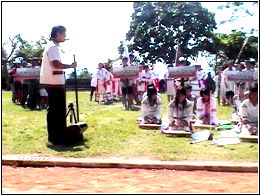
|
Assigning
works to the team members was
the key to diversified data. As
the proverb goes, “two heads are
better than one”. It has been
very important for all the team
members to work together but
take their own responsibilities. |
We understood the significance
of carefully reading through the
data found on-line, digitalizing
data which matched the theme or
relevant topics and providing
connections through FrontPage
software or the campus website
server to systemize the data
through major topics description
or hyperlinks to serve as
references for future researches
relevant to the community.
The volunteers from Tzu Chi
University integrated data found
in the books borrowed from the
campus library, which was a
significant part through out the
interview process. The elders’
answers regarding the
complicated ceremonies could
almost all be found in the data;
if relevant preparation was not
made, the original expectation
would not be met.
In addition to giving related
lectures in current curriculum,
the school teachers also helped
the pupils write down their
thoughts, create web pages and
visit the community during noon
breaks and on holidays. |
(7) Schedule control

|
This was the second time our
school participated in Cyberfair;
however, the schedule was not
always followed because it was
difficult to find a balance
between the courses and the
activities. The failure of
regular records of the time of
uploading schedule reports in
particular, would affect the
following schedules and the
complete presentation of the
entire work. |
Regarding the control of the
schedule, we uploaded the
schedule form to the web site to
clearly notify the team members
of the assignments of each
stage. Another solution was the
on-campus server; the written
data were collected and
processed by the team members
and uploaded by the plan
executer. |
|
 |
|
|
(6) Afterthoughts |
|
 |
|
Jian Ching
Elementary
School |
|
Director
Shou-liang Hsu |
|
A large number of the
Truku tribal folklore
activities are held from
September to November
every year, during which
these ceremonies with
the most profound
cultures are celebrated
in such a simple and
quick way that most
people do not have the
opportunity of
understanding the rich
cultures of the tribe.
The New Aspen Cultural
Information Club of our
school has always played
the role of cultural
researches. With the
professional
instructions of the
teachers, the hard work
of the students and the
supports of social
resources, we have been
through 2 Cyberfair
projects and have
achieved great results. |
|
 |
|
Jian Ching
Elementary
School |
|
Teacher Shu-jun
Hua |
|
The project of the Truku
Thanksgiving ceremony
exploration has been
carried out for more
than 2 years. From data
collection and
interviews with the
elders, we have
completed so many works
with the pupils,
including the works
completed by the
graduates. I felt deeply
touched when I saw the
web pages that we have
worked so hard on.
I have an even further
understanding of the
tribal cultures after
this exploration and
have stronger interests
in exploring deeper into
the Truku tribal
cultures. I am looking
forward to greater
results from the “New
Aspen Cultural
Information Club”! |
|
 |
|
Jian Ching
Elementary
School |
|
Teacher De-lin
Ai |
|
This was my second time
assisting students in
Cyberfair project. With
the first experience, we
had a much clear idea of
our works. Through
profound discussions and
the students’ hard work,
we gradually headed
towards our goal. We
have been through so
many years of hard work
since the project theme
was decided.
The person who made the
greatest contribution to
the project was Teacher
Shu-jun Hua. She planned
the entire research and
assisted the pupils in
every aspect, which I
admired deeply. Through
the process of helping
the students, I have
seen their improvements
and hard work pay off,
which was the biggest
reason I enjoyed the
project so much.
I would like to again
show my appreciation to
the principal, the
director and the entire
teacher team for their
support and assistance.
This project has been a
valuable experience no
matter. |
|
 |
|
Jian Ching
Elementary
School |
|
6A Hui-yu Yan |
|
Time has flied since the
establishment of New
Aspen Club. I have
learned so much about
the
Ancestral Worship
Ceremony, including the
clothing of the oracle,
the sacrificial
offerings and the
qualification of an
oracle. I have been
really glad and honored
to be given this
opportunity of
participating in
Cyberfair project that I
have learned things that
I have never learned
before.
I would also like to
thank our teachers for
their support whenever I
confronted problems and
for visiting the chief
of the tribe with us. |
|
 |
|
Jian Ching
Elementary
School |
|
6A
wang-yan |
|
I have learned so much
from the New Aspen Club
since the beginning; for
example, I have learned
about video production,
photography, shooting
and have improved my
skills of drawing on the
computers. In addition,
I have had a much better
understanding of the
taboos, foods and
clothing of Truku tribe.
I believe I have gained
so much.
I am very glad to be
given the opportunity of
participating in
Cyberfair project
because I am honored to
be a school
representative and that
I enjoy the process. I
completed my works
though I was afraid that
I might make mistakes.
Teacher Ai and Teacher
Hua would always check
our works in the
computer room at noon,
ask us to correct
mistakes, make
improvements and pay
attention to certain
details. I am grateful
for their help because I
learned how to use
cameras and camcorders.
I am looking forward to
next opportunity. |
|
 |
|
Jian Ching
Elementary
School |
|
5A Yu-bo Wen |
|
I have had a lot of fun
since I participated in
the Cyberfair project,
which enabled us to
learn about the cultures
of Truku tribe. I am
glad to have this
opportunity because I
have learned so much. I
am looking forward to
next opportunity. |
 |
|
見晴國小 |
|
6A Meng-tze Li |
|
This
was my second time
participating in this
project. Last time I got
to know ramie, which
people used to make
clothes while this time
I learned about
ceremonies. Both
opportunities allowed me
to learn about the
cultures and relevant
knowledge of Truku tribe
such as oracles,
ceremonies and cloth
weaving. I was happy
that I could have the
opportunity of
collecting information
from other villages and
gaining knowledge. I am
looking forward to more
learning opportunities. |
 |
|
見晴國小 |
|
6A Yu-ling Wen |
|
This was my first
participation in the
Cyberfair project.
Before the project,
Teacher Hua told us
about the major works of
this semester and
important parts that we
should pay attention to.
Sometimes Teacher Hua
and Teacher Ai also
taught us how to look up
information on-line in
the computer room!
I am glad that I have
learned so much about
the Ancestral Worship
Ceremony
and other relevant
knowledge! I would also
like to thank
Teacher Hua and
Teacher Ai for their
tutoring during noon
breaks. |
 |
|
見晴國小 |
|
4A Yu-chi Gao |
|
I am happy that I
learned about many
traditional cultural
relics though this was
my first time
participating in the
project. We went to the
computer room typing or
drawing traditional
cultural relics during
every noon break. We
drew oracles in the
Ancestral Worship
Ceremony, who gave
speeches about
traditional cultural
relics. I learn to
concentrate on my works
and absorbed knowledge
about the sacrificial
offerings.
I would like to thank
Teacher Ai and Teacher
Hua for their help. I am
glad to have this
opportunity and I am
looking forward to the
next one. |
 |
|
見晴國小 |
|
6A Pei-hsuan Hsu |
|
This was my second time
participating in the
project. Last time we
learned how to weave and
make clothes with ramie.
This time we learned
about ceremonies.
From these 2
opportunities, I have
learned about the
weaving skills of
clothes and baskets,
taboos and cultures of
Truku tribe. In
addition, I think
visiting the elders was
so much fun because we
could talk to them in
person and through web
cameras. We could see
them and listen to them
clearly. I am glad that
I have learned so much. |
 |
|
見晴國小 |
|
Meng-yuan He |
|
I
have participated in
Cyberfair project
before. Last time, we
interviewed the oracle
and during the process I
even worked as the
photographer. Through
these experiences, I
have learned about cloth
and basket weaving
skills, the taboos,
ceremonies and clothing
of indigenous people. It
was so much fun!
 |
|
 |
|
(1) Purpose and mission |
|
The purpose of education
is to develop
students’potential and
cultivate their ability
of adaptation and
improving their living
environments.
Participating in
Cyberfair enables every
team member to make
improvements and
realizes the goal of
Grade 1-9 Curriculum.
Since the research theme
has been decided, the
supervisors, people in
the communities and
volunteered students
have taken the
responsibility of
exploring Truku tribe’s
ceremonial culture. The
progress is a
combination of wisdom,
experts’ documents,
resources provided by
the school and community
as well as information
technology to present a
complete result. |
|
(2) Educational content |
|
The experience our team
members have been
through throughout the
process of Cyberfair
project matches the
education concept of
Grade 1-9 Curriculum,
which are as follows:
1. Humanity thinking
Our team members learned
to understand their own
abilities, respect and
appreciate the
characteristics of other
people and the
differences between
people of different age.
2. Ability to integrate
Instead of teaching in
the classrooms, we took
the students to the
communities, aiming to
cultivate their sensible
and sensitive attitude
and integrate humanity
quality and technology
instead of forcing them
to absorb or memorize
fragmented knowledge.
3. Democracy
The students learned to
improve their ability of
self-expression and
communication through
interviews, learned to
take down the interview
records and thoughts
through independent
thinking trainings,
learned to develop their
own abilities trough
working as a group,
learned to actively
participate in cultural
activities in the
community and make
contribution to cultural
transmission, and
cultivate the habit of
abiding by the law
through understanding
intellectual properties.
4. Native soil and
international awareness
Through the process of
planning, extraction and
dyeing of ramie, we
cultivate a passion for
the native culture and
environment of our
country. Such a process
is definitely worthy of
sharing with other
nations.
5. Life-long learning
Through continuous
interviews and records,
we have gradually
learned to actively
collect and process
information, raise
questions and solve
problems, to provide our
achievement with a value
of preservation and
further development.
 |
|
(3) What information tools &
technologies did you used to complete
your CyberFair project? |
|
Technologies |
Content |
|
(1) Web phone |
A tool of contacting team
members and communicating with
interviewees prior to the
interviews. |
|
(2) TV |
A tool for sharing the video of
2006 and 2007 Wanrong Township
folklore artistry activities |
|
(3) Video and digital cameras |
A tool for recording community
visits and folklore activities |
|
(4) Scanners |
A tool for completing students’
works and selecting references |
|
(5) Dictaphones |
An important tool for recording
the oral narration and
processing written records |
|
(6) Software |
FrontPage 2003, PhotoImpact 8,
EasyPHP+Xoops, server, ACDsee
image management, Banrtong Midi
Creation Software, CDex music
converter |
|
(7) Book, periodicals and
research papers |
Reference books relevant to
Truku tribe ceremonial cultures
and research papers provided by
interviewees. |
|
(8) Interviews |
Interviewing elder people to
completely record their oral
narrations. |

|
|
(4) In what ways did you act as
"ambassadors" and spokespersons for your
CyberFair project both on-line and in
person. |
|
First of all, the
students have absorbed
so much knowledge and
learned so many skills
during such a short
period of time. In the
beginning, when asked
about what they were
doing, they would say
they were using the
computers. However,
their answer has changed
because they have been
to too many places,
interviewed too many
people, written too many
thoughts and made use of
so many latest resources
and equipments at
school. Now, they would
say they are honored to
have participated in
this meaningful
activity.
We would like to thank
Mr. You-hsiang Hsu from
Hualien County Shioulin
Township Tonglan
Village, Mr. Chung-yi
Chen Lin from Wanrong
Township Hongyeh Village
for accepting our
interviews. Their
professional knowledge
relevant to the
Thanksgiving ceremony
has greatly helped us
throughout the process
and allowed to learn
about the rich culture
of Truku tribe.
We would like to show
our appreciation to Kaji
Cihung, a local history
and culture worker at
Shioulin Township
Tongmen Village with a
degree in Anthropology
at Tzu Chi University.
From his “Improvisation
and Tanscendence: The
Seejiq Truku
Village
Ritual and Ancestral
Images”,
we could completely
understand the history
of the Thanksgiving
ceremony and therefore
have learned a lot.
We would like to thank
Ms. Ching-hsiang Hu for
her “Hualien County
Sejiq Truku Traditional
Ballads”, which
completely presents the
authenticity of the
traditional music of
Truku tribe. We have
been very honored to be
give the opportunity of
listening to her music,
from which we could
experience the vigor and
profoundness in the
forests and the
mountains.
We would like to thank
Hualien County Wanrong
Township Office and
Shoulin Township Office
for its organization of
the Thanksgiving
ceremony, which gave us
and so many others an
opportunity of having a
close contact with the
great traditional Truku
tribe cultures.
We are members of the
New Aspen Club who have
taken the responsibility
of culture transmission.
We will carry on this
work and have close
interactions with the
communities and school
to ensure the
preservation of local
cultures. |
|
(5) Intellectual Properties |
|
We would always
carefully write down our
thoughts after each
interview. It was
difficult to present the
actual situation though
we were only required to
write short articles.
The teacher gave
speeches about
intellectual properties;
therefore, we had been
very careful when
quoting information
(words, photos,
illustrations, music and
videos) on-line that we
always provided
bibliographies and
copyright agreements to
show our respect to the
authors. |
|
(6) Discoveries, Lessons
and Surprises |
|
Many people have a
strong passion for their
ideals and work hard to
achieve them. From
elders and experts with
great knowledge of
traditional ceremonies
such as Hongyeh Village
Head, Mr. Chung-yi Chen
Lin, Wanrong Village
Head, Mr. A-yuan Cheng,
Tongmen Village Head,
Mr. You-hsiang Hsu to
music collectors Ms.
Ching-hsiang Hu and Mr.
Kaji Cihung, we have
discovered a common
feature: they persist in
their interests. They
showed an awe in
ancestors, strong
confidence, courage and
professional attitude
when we rediscovered
their wisdom. Their
strong power of
knowledge has led us
towards to great hall of
cultures and society
step by step. The lesson
we have learned was that
we needed to make a
better use of time and
improve our
communication ability
with the tribe.
 |
|
 |
|
Participants |
Responsibilities |
Percentage |
|
Students |
Carrying out interviews
Shooting
Recording interview contents
Editing written information
Providing interview outlines
Uploading reports
Collecting informatio |
50% |
|
Instructors |
Convening small group meetings
Analyzing research information
Assisting and inspecting web page
creation
Deciding project name and plans
Helping with computer skills
Giving schedule reports |
30% |
|
Parents |
Contacting other interviewees in the
community.
Providing advices regarding the
plans and translating. |
5% |
|
Community residents and experts
|
Interviewing elders with experience
participating in the ceremonies and
experts of this field.
Providing relevant written
information and ballads. |
10% |
|
Department of Medicine at
Tzu Chi
University |
Providing opportunities of
understanding and experience
information media on Saturdays and
holidays.
|
5% |

|
|
|
|